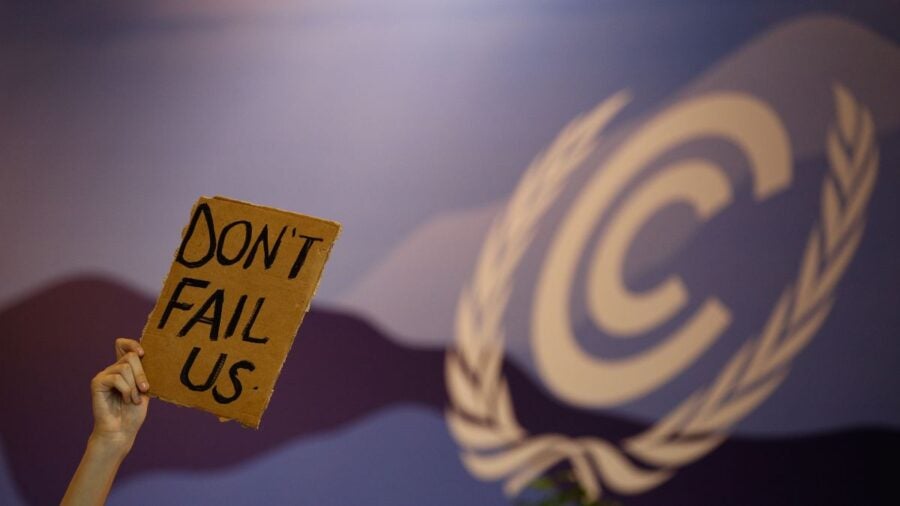
The United Nations’ COP26 climate conference in 2021 focused on humanity’s hopes of limiting global warming to 1.5°C above pre-industrial levels. As the dust settles on its 27th annual gathering, it’s clear that little has been done at this level to avert a temperature increase that the UN believes is more likely to be 2.8°C by the end of the century.
Ioannis Ioannou is associate professor of strategy and entrepreneurship at London Business School and a specialist in sustainable business. Although he had low expectations going into COP27, his verdict on the event is that it was nothing more than a “disaster”.
In Ioannou’s view, standing still on climate action is tantamount to moving backwards. With no progress made on global emissions reductions at Sharm El Sheikh, there are widespread fears that the UN’s 1.5°C goal is already beyond reach.
A ‘dead end’ for climate action
While COPs may once have offered hope to those seeking concerted action against an existential threat to humanity, Ioannou believes that these meetings have “reached a dead end”, having been “hijacked by fanfare, greenwashing and vested interests”.
This year’s conference was attended by well over 600 lobbyists with connections to oil, gas or coal, according to Global Witness, while resistance from Saudi Arabia and Russia meant that no deal on cutting the use of fossil fuels could be reached.
COPs have been hijacked by fanfare, greenwashing and vested interests
Disagreements on the phasing-out of polluting fuels caused references to “low emissions” energy sources to be included in the final agreement. Its loose wording means that an increase in the use of certain fossil fuels could still be permitted. But the deal was approved, owing to the progress it made on securing compensation payments for countries worst affected by loss and damage.
COP28 is to be hosted by the UAE, one of the world’s biggest oil exporters. Should we still be looking to these conferences, where the interests of fossil-fuel lobbyists and petrostates seemingly hold sway, for leadership in tackling the climate emergency?
This take is too cynical for the liking of Kaya Axelsson, net-zero policy engagement fellow at the University of Oxford. She argues that the significance of COP27’s progress on loss and damage cannot be overstated, adding that the international solidarity shown in Sharm was palpable.
Business steps into the breach
While delegates at COP27 were fudging the issue of fossil fuels, the We Mean Business Coalition brought together hundreds of concerned companies to declare 1.5°C to be a “limit, not a target”. Similarly, the Confederation of British Industry’s deputy decarbonisation director, Tania Kumar, spoke of the need for “swift and decisive implementation” after her visit to Sharm.
Axelsson is encouraged by the “ambitious corporates” at COP27 that were calling for more environmental regulation. Many businesses that have acted swiftly to reduce their ecological impact believe it’s unfair that other firms aren’t obliged to follow suit.
A new report by the UN’s High‑Level Expert Group on the Net-Zero Emissions Commitments of Non-State Entities could help in this respect, as it aims to improve the standard of net-zero pledges and prevent greenwashing. For instance, it’s no longer enough for businesses to follow their own interpretation of net zero; it has to be backed by a science-based transition plan. The UN’s secretary-general, António Guterres, has described the document as a “how-to guide to ensure credible, accountable net-zero pledges”.
In some respects, businesses are showing more ambition than nation states. Recent figures show that a record number of enterprises have disclosed information about their greenhouse gas emissions through the Carbon Disclosure Project, while 82 of the FTSE 100 have set net-zero emissions targets.
Advertising giant WPP, for instance, has set a target of attaining net zero across its supply chain by 2030. BT is aiming to reach the same landmark by 2041. The UK’s net-zero target is set for 2050.
While such goals are laudable, hitting them will require much effort, investment and steadfast leadership. But, if these can be achieved, hopes of a 1.5°C future may yet be kept alive.

The United Nations’ COP26 climate conference in 2021 focused on humanity’s hopes of limiting global warming to 1.5°C above pre-industrial levels. As the dust settles on its 27th annual gathering, it’s clear that little has been done at this level to avert a temperature increase that the UN believes is more likely to be 2.8°C by the end of the century.
Ioannis Ioannou is associate professor of strategy and entrepreneurship at London Business School and a specialist in sustainable business. Although he had low expectations going into COP27, his verdict on the event is that it was nothing more than a “disaster”.
In Ioannou’s view, standing still on climate action is tantamount to moving backwards. With no progress made on global emissions reductions at Sharm El Sheikh, there are widespread fears that the UN’s 1.5°C goal is already beyond reach.
